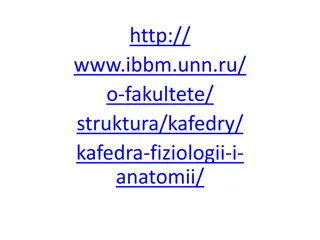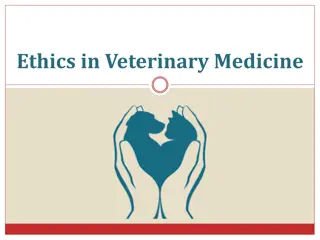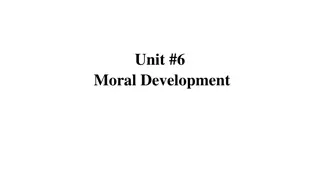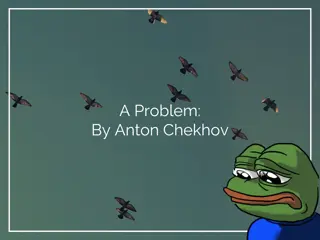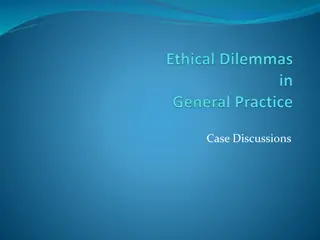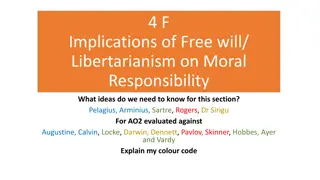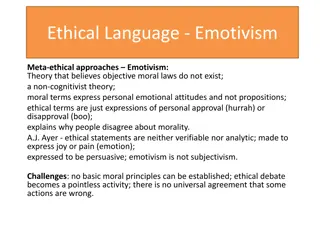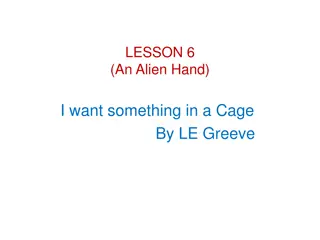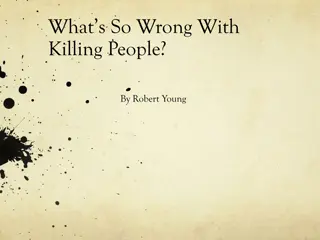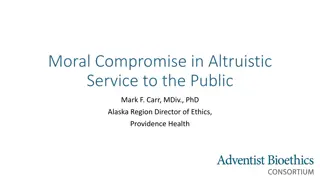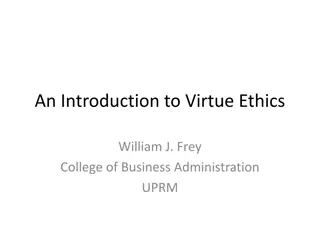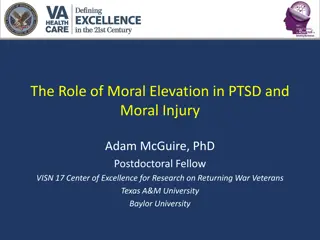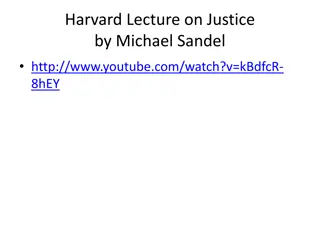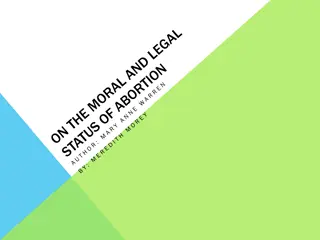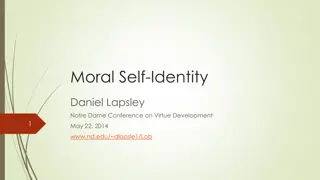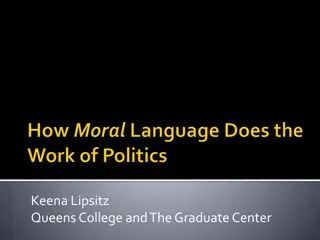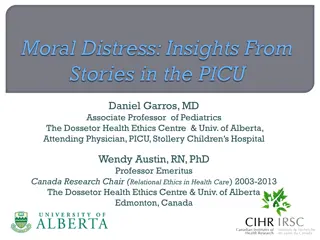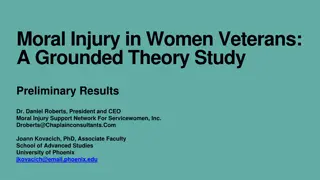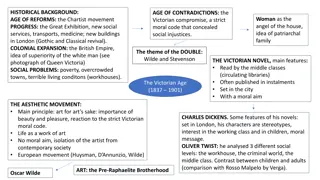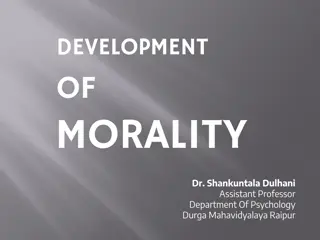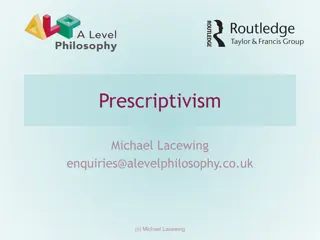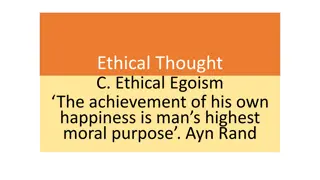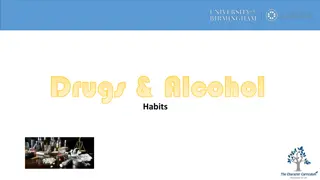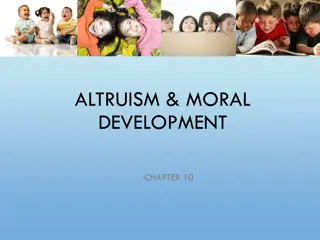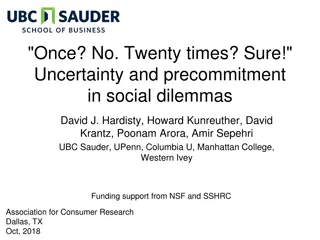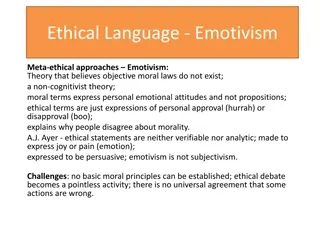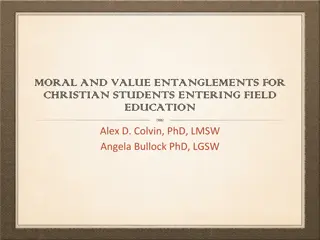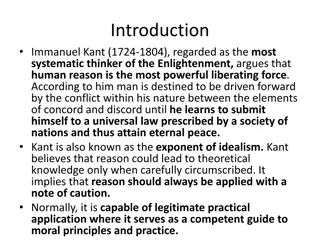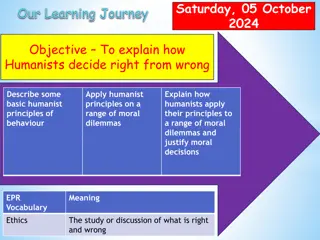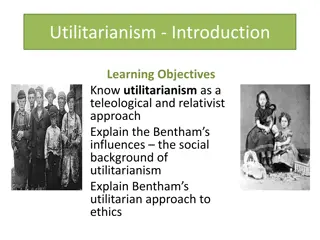Uncovering the Violent History of Capitalistic Enclosures
Explore the historical context of capitalist enclosures, their violent impacts on peasants, and the moral justifications used to conceal these atrocities. Delve into how economic narratives created moral bubbles to justify violent acts, as examined through the lens of Marx's analysis. Unveil the par
1 views • 11 slides
Exploring Ethics: Branches, Theories, and Moral Dilemmas
Ethics delve into Meta Ethics, Normative Ethics, and Applied Ethics to understand moral concepts and decision-making. The discourse covers various ethical theories like Absolutism, Relativism, Subjectivism, and explores the difference between Teleological and Deontological decision-making. Thought-p
5 views • 14 slides
Understanding the Moral and Ethical Aspects of Abortion
Abortion is the termination of a pregnancy, raising moral and ethical dilemmas. Types of abortion include medical and artificial methods, legal considerations, and medical indications for termination. Social reasons for abortion include court decisions, rape, imprisonment, disability, or spousal dea
1 views • 43 slides
Ethics in Veterinary Medicine: Addressing Ethical Dilemmas in Animal Care
Ethics in veterinary medicine focuses on the moral aspects of human behavior and decision-making when faced with conflicting choices. It explores key issues such as animal surgeries, hospitalization, and euthanasia, aiming to determine the most ethical course of action in treating animals. Veterinar
0 views • 30 slides
Understanding Kohlberg's Stages of Moral Development
Kohlberg's stages of moral development, built upon Piaget's psychological theory, outline six developmental stages of moral reasoning, with each stage offering a higher level of response to moral dilemmas. Kohlberg focused on justice in moral development and emphasized the importance of how individu
0 views • 19 slides
Understanding Moral Development and Moral Reasoning
Moral development involves an individual's sense of right and wrong, influenced by family, school, friends, and societal environment. Children learn moral concepts from interactions with parents, teachers, peers, and society, shaping their understanding of good and bad. Additionally, moral reasoning
0 views • 13 slides
A Problem: Analysis of Family Honor and Moral Dilemmas in Anton Chekhov's Work
Explores the moral dilemma faced by the Uskov family when dealing with Sasha's forgery and non-repayment, highlighting the differing views of paternal uncles and the eventual realization of Sasha's criminal tendencies despite the family's attempts to spare him from punishment.
0 views • 19 slides
Understanding Medical Ethics: Principles and Applications
Ethics in the medical field involves moral limitations on power, emphasizing the importance of serving and protecting the vulnerable. Key principles such as autonomy, beneficence, non-maleficence, and justice guide ethical decision-making in healthcare, promoting respect, empathy, and fairness. Vari
0 views • 19 slides
Moral Responsibility and Free Will Implications in a Contemporary Context
This text delves into the implications of free will and libertarianism on moral responsibility, examining the ideas of various philosophers and thinkers such as Pelagius, Arminius, Sartre, and more. It explores the concepts of moral agency, determinism, normative ethics, religious beliefs, and the c
5 views • 12 slides
Understanding Emotivism in Ethical Philosophy
Emotivism is a meta-ethical theory that rejects objective moral laws, instead positing that moral terms express personal emotional attitudes, not universal truths. Influenced by A.J. Ayer and rejecting naturalism, this theory suggests that ethical statements are not objective propositions but rather
0 views • 28 slides
Ethical Decision Making in Clinical Practice: Understanding Dilemmas and Solutions
An examination of ethical decision making in nursing, focusing on defining ethical dilemmas, addressing moral distress, and exploring the purpose of nursing ethics. The importance of aligning personal and professional values, ethical principles, and laws in resolving ethical dilemmas is discussed, a
0 views • 8 slides
Lesson 6: An Alien Hand - A Captivating Story of Moral Reflection
Explore the intriguing story of a strange customer's unusual request in Mr. Purcell's pet shop. Witness a thought-provoking tale that challenges perceptions on life choices and ethical treatment of living creatures. Dive into the narrative enriched with themes of empathy and moral dilemmas, offering
2 views • 7 slides
Contemplating the Ethics of Killing in "What's So Wrong With Killing People?" by Robert Young
Robert Young delves into the complex moral dilemmas surrounding killing, exploring justifications for acts such as self-defense, euthanasia, and even the philosophical implications of life imprisonment. Questions of moral responsibility, the right to life, and scenarios like killing for the greater
1 views • 15 slides
Moral Compromise in Altruistic Service: Navigating Healthcare Ethics
Altruism in healthcare raises dilemmas of moral compromise, as faith-based providers balance societal norms with personal convictions. The call to be altruistic like Christ conflicts with legal and medical standards, prompting reflection on conscience and professional obligations.
0 views • 8 slides
Challenges and Opportunities of Moral Revolution in Indonesia
The need for a moral revolution in Indonesia to address societal issues like corruption, conflict, and intolerance. Contrasting mental and moral revolutions, the focus is on behavior change to build a humane society with healthy moral values. Initiatives and discussions highlight the urgency of tran
0 views • 13 slides
Exploring Virtue Ethics and Human Flourishing
Delve into the realm of virtue ethics, uncovering the significance of moral education, self-excellence, and rethinking traditional moral theories. Learn how virtues shape our actions, character, and perception of ethical dilemmas, ultimately leading to human fulfillment and happiness.
1 views • 21 slides
Understanding Moral Elevation in PTSD and Moral Injury
The research by Dr. Adam McGuire explores the role of moral elevation in PTSD and moral injury, emphasizing how witnessing virtuous behaviors triggers emotional and physical responses leading to a desire for imitating virtuous acts. By integrating prosocial emotions into trauma treatment, the positi
0 views • 13 slides
Ethical Dilemmas and Justice Scenarios Examined
Explore various moral dilemmas and justice-related scenarios presented in thought-provoking situations such as saving a drowning boy, the plank of Carneades, a pregnant woman facing imminent danger, and a philosophical debate on justice theories. Delve into questions of moral obligations, legal impl
0 views • 11 slides
Understanding Humanity and Moral Community in the Context of Abortion Ethics
Exploring the complex ethical considerations surrounding abortion, this discussion delves into determining the humanity of a being, defining the moral community based on traits of personhood, fetal development, and the right to life. The arguments include the morality of abortion, the definition of
0 views • 9 slides
Challenges to Moral Anti-Realism: Objections and Responses
The article explores objections to moral anti-realism, including moral nihilism, condemning immorality, and the notion of moral progress in the absence of moral reality. It addresses concerns about the justification for interfering with others' behavior, the relationship between moral beliefs and ob
0 views • 6 slides
Understanding Moral Self-Identity Development
Situating moral self-identity within ethical theory and developmental psychology, this overview explores the centrality of morality within the self-concept. It discusses the chronic accessibility of moral schemas, the importance of strong evaluation in moral behavior, and the connection between mora
0 views • 33 slides
Understanding Moral and Constitutional Values in Relation to Judiciary
Explore the concepts of moral values and constitutional values, emphasizing their importance in decision-making processes and societal norms. Discover the stages of moral development and delve into constitutional values such as sovereignty, socialism, secularism, democracy, justice, liberty, equalit
0 views • 9 slides
Analysis of Moral Language in Political Communication
Explore how Republican and Democratic elites use distinctive moral language and its impact on voters in the context of the 2012 election data. Discover the application of Moral Foundations Theory in understanding political differences in the United States and how moral intuitions influence public op
0 views • 13 slides
The Influence of Disgust on Moral Behavior in Psychological Research
Explore the impact of disgust on moral behavior through various studies, including moral dilemmas and criteria for moral judgment. Research delves into how disgust affects decision-making processes related to moral dilemmas and helping behavior. Discover the connection between physical disgust and i
0 views • 16 slides
Understanding Moral Distress in Healthcare
This content discusses the concept of moral distress in healthcare, defined as the pain and anguish experienced when one knows the right thing to do but faces internal or external barriers preventing action. It explores the implications of moral distress on healthcare practitioners and emphasizes th
0 views • 25 slides
Insights on Moral Injury Among Women Veterans: Preliminary Study Findings
Preliminary results from a grounded theory study on moral injury in U.S. women veterans reveal themes such as sexual assault, hostile work environments, and more. Participants shared their experiences, highlighting the nature of moral injury they faced, distinguishing between various forms of discri
0 views • 21 slides
Victorian Literary Movement: Aestheticism and Social Critique
The Victorian era was marked by social reforms, colonial expansion, and contradictions like the strict moral code alongside social injustices. Literary figures like Charles Dickens, Oscar Wilde, and Robert Louis Stevenson illuminated these themes through novels exploring duality, hypocrisy, and soci
0 views • 4 slides
Understanding Moral Development: Insights and Perspectives
Morality is the belief in right behavior accepted by society. It involves moral behavior, feelings, and judgments. Moral development evolves from childhood to adulthood, influenced by experiences and challenges. Freud's id, ego, and superego theory and Skinner's behaviorism contribute to our underst
0 views • 12 slides
Exploring Moral Judgments and Prescriptive Meaning in Ethics
This content delves into non-cognitivism, Hare’s prescriptivism, and moral anti-realism to understand what we do when making moral judgments. It discusses prescriptive meaning, the concept of good, and how moral language guides actions. The objections raised regarding moral language's functions, p
0 views • 9 slides
Exploring Ethical Egoism: A Philosophical Perspective
Ethical egoism emphasizes an individual's pursuit of happiness as the highest moral purpose. It questions whether human behavior is solely driven by self-interest or altruism. The theory poses ethical dilemmas such as the duty to contribute to famine relief despite personal luxuries, highlighting th
0 views • 21 slides
Understanding Habits, Addiction, and Ethical Dilemmas
Explore the complexities of habits, addiction, and ethical decision-making through thought-provoking scenarios and real-life stories. Delve into the challenges of breaking habits, the virtues required for change, and the impact of role models in addiction prevention. Reflect on moral dilemmas and co
0 views • 6 slides
Understanding Altruism and Moral Development Theories
Explore the components of morality, theories of moral development by prominent psychologists like Piaget and Kohlberg, and the stages of moral development in individuals. Learn about moral affect, reasoning, and behavior as integral aspects shaping one's ethical framework and decision-making process
0 views • 40 slides
Uncertainty and Precommitment in Social Dilemmas
This research explores the impact of uncertainty and precommitment on social dilemmas, specifically focusing on the Interdependent Security (IDS) scenario. It investigates how precommitment influences investment rates and decision-making in situations involving stochastic losses and risky investment
0 views • 56 slides
Friedrich Nietzsche's Genealogy of Morals: Uncovering the Evolution of Moral Values
Friedrich Nietzsche critiques traditional philosophy for overlooking the historical development of moral concepts. He argues that moral judgments were initially based on strength and power, later evolving into the dichotomy of master and slave morality. By tracing the genealogy of moral terms, Nietz
0 views • 10 slides
Understanding Emotivism: A Non-Cognitivist Theory in Ethics
Emotivism is a meta-ethical theory that posits the absence of objective moral laws, suggesting moral terms express personal emotional attitudes rather than propositions. Influenced by philosophers like A.J. Ayer and Hume, it challenges the existence of basic moral principles and universal agreement
0 views • 23 slides
Navigating Moral and Value Challenges for Christian Students in Field Education
This presentation explores the moral and value dilemmas faced by Christian students entering field education in social work. It addresses the conflicts that may arise due to differences in morals, values, and beliefs, offering strategies to assist students in navigating these challenges effectively.
0 views • 23 slides
Kant's Moral Philosophy: Reason, Freedom, and the State
Immanuel Kant, a prominent Enlightenment thinker, emphasizes the liberating power of human reason in guiding individuals towards moral principles and practices. Kant's moral philosophy centers on treating each person as an end-in-itself, driven by the good will informed by reason. His concept of mor
0 views • 14 slides
Humanist Moral Decision Making: Principles and Dilemmas
Humanists determine right from wrong by considering consequences, empathy, happiness, and reason instead of religious rules. Applying principles such as empathy and the golden rule, they navigate moral dilemmas like witnessing a theft and deciding whether to involve authorities based on minimizing h
0 views • 20 slides
Understanding Utilitarianism: Bentham's Moral Philosophy
Utilitarianism, a teleological and relativist ethical theory created by Jeremy Bentham, focuses on maximizing happiness and minimizing pain for the greatest number of individuals. Bentham's Act Utilitarianism emphasizes the principle of utility and uses the hedonic calculus to measure pleasure. This
0 views • 20 slides
Forms of Moral Reasoning and Ethics in Decision-Making
Explore the main forms of moral reasoning in ethical decision-making, including virtue ethics, deontological reasoning, and teleological reasoning. Understand the importance of developing ethical virtues and principles in guiding behavior. Delve into examples of reasoning from virtue and deontologic
0 views • 28 slides


